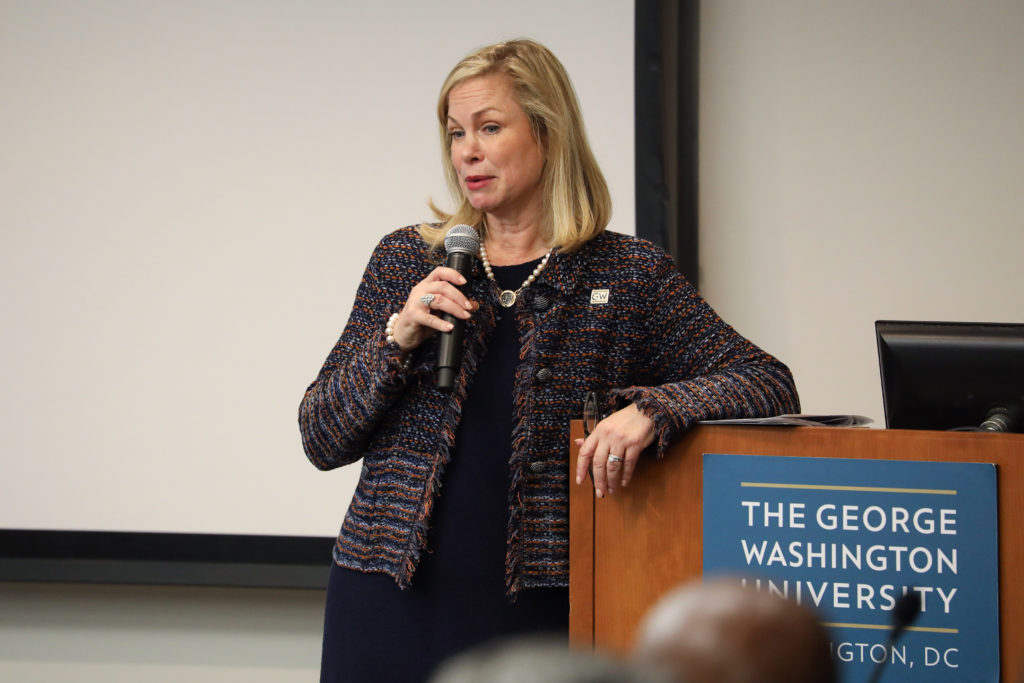This fall, some donors received thank you notes for gifts they gave to GW four years ago, officials said.
Donna Arbide, the vice president for development and alumni relations, said at a Faculty Senate meeting earlier this month that since she started working at GW last year, she has sent thank you notes to donors who contributed years ago and given hats with GW logos to current donors. She said the tokens of appreciation will help retain donors amid an office-wide push to build up GW’s donor base to prepare for the University’s next capital campaign.
“I can’t tell you how many people said, ‘I really like that hat,’ but what they also said was, ‘I really appreciate it, although I gave you that money four years ago,’” she said at a Faculty Senate meeting earlier this month.
University spokeswoman Lindsay Hamilton said the office has processes to thank donors and keep them informed about how their money is used.
“The University is incredibly grateful to our donors at all levels, and we always want to make sure they are acknowledged,” she said.
Hamilton declined to say why the department was behind on sending thank you notes. She declined to say how many thank you notes were sent in the past five fiscal years.
She declined to say how different levels of donors are thanked for their gifts. Hamilton also declined to say what is included in thank you notes and how the notes vary for different types of donors.
She declined to say why the University chose to give out baseball caps to top donors or what the University gave top donors previously. She declined to say how much money donors have to give to receive a baseball cap.
Fundraising experts said being late on thank you notes could negatively affect donor retention.
GW has struggled with alumni giving and engagement, with the alumni giving rate hovering at about 8 percent in recent years.
Leslie Zornow, the executive director of stewardship at the University of Rochester, said every donor is acknowledged for their gift. The notes range from a message from an academic department to the university president. The department aims to get notes out within two weeks, she said.
Zornow said making the donor feel appreciated doesn’t guarantee more money, but it keeps the donor interested and reminds them about their generosity.
“I don’t know if you will get an additional gift because of an acknowledgement, but I do know that if you don’t acknowledge or the donor doesn’t feel appreciated, then you will lose them,” she said.
Elizabeth Lowe, the development coordinator at the University of Southern California, said donors receive a thank you note if their gift is more than $5,000 or the donor is a person affiliated closely with the school, like a trustee.
She said a gift of more than $50,000 warrants a thank you note personally signed by the president of the university.
“Anyone below that – they’re all important – but if the president is signing all of them, we want to make sure it’s a very important gift,” Lowe said.
Rick Cohen, the chief operating officer and chief communication of the network of nonprofits National Council of Nonprofits, said sending thank you notes after a year or more calls attention to the lateness of the appreciation. He said timely thank you notes show donors that there is an efficient structure in place at the development office and that financial gifts are valued by the University.
He said a month is considered the maximum amount of time to wait before sending notes at most organizations – but he said it’s better to send a late note than never send one at all.
“Even if you’re two years late, it’s still important to thank anybody who gave, that’s a good thing,” he said.
Lori Gusdorf, the executive vice president of the Association of Fundraising Professionals Foundation for Philanthropy, said donors have told her that if they don’t receive “timely acknowledgement” from a group, they will not give in the future.
Gusdorf said her organization sends out notes or an email within two days of receiving a gift, but having even a year delay is not standard practice.
“To me, that’s kind of unacceptable, and I think to the donor too,” she said. “A year behind would actually be a worst-case scenario.”
Amy Liu contributed reporting.



